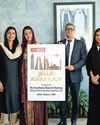
Interview
Prof Yogesh Singh, vice chancellor, University of Delhi
Q What are the trends in higher education in India and how do they compare with the west?
A Higher education in our country is passing through a transformative phase. Many provisions of the National Education Policy 2020 were not there earlier. Now every institution is implementing the NEP. So things are improving at the ground level. We also need to understand that proper emphasis had not been given earlier to skill and value education. The purpose of education is also to make good human beings. In the higher education scenario, things were missing earlier. We are incorporating those in the curriculum.
Another interesting aspect is the new credits system. For instance, if someone wants to play or wants to take sports as an elective, then credits are assigned to the course and those may be given to the student. Now, there is a system for assigning credit to such courses. Many good things are happening in the higher education institution. The NEP has given us a platform to experiment.
Q What changes have you made in your curriculum?
A We are in the process of implementing the NEP and are designing a new curriculum. We are continuously improving it. Now it is research-based and research-intensive. This promotes conceptual understanding. By the next academic session, we will have the revived MPhil (Clinical Psychology); MPhil was not under the NEP. There are also the programmes started last year, such as Hindu studies, Korean studies and BA LLB five-year programme.
This story is from the May 26, 2024 edition of THE WEEK India.
Start your 7-day Magzter GOLD free trial to access thousands of curated premium stories, and 9,000+ magazines and newspapers.
Already a subscriber ? Sign In
This story is from the May 26, 2024 edition of THE WEEK India.
Start your 7-day Magzter GOLD free trial to access thousands of curated premium stories, and 9,000+ magazines and newspapers.
Already a subscriber? Sign In

Lessons in leadership
When I began my career at Hindustan Lever (as HUL was then called), I was deeply inspired by our chairman, Dr Ashok S. Ganguly.

Political colours
One of the greatest fashion statements of recent times was made in the Parliament's winter session by Rahul Gandhi and some opposition colleagues. India's most news-making politician (since his landmark Bharat Jodo Yatra) gave up his signature white polo T-shirt for a blue one.

Chat roam
Vox pop content is seeing an uptick in India, with creators making conversations on current and social issues fun and funny

Back home with BANNG
Michelin star-winning chef Garima Arora, who recently opened her first restaurant in India, on all things food and family

One supercalifragilisticexpialidocious New Year
Once Christmas is over, tension mounts in our home as the little woman and I start ticking off the days. We both remain on edge because we dread the coming of the New Year—a time when the whole world goes crazy and adopts resolutions. We, too, make New Year promises and our ‘list of past resolutions’ is very long and impressive. Unfortunately, we are complete failures at keeping them and our ‘list of resolutions not kept’ is equally long and equally impressive.

Six or out?
Cricket is a quasi-religion in India. And our pantheon of cricketers is worshipped with a fervour bordering on hysteria.

DOWN AND UNDER THE WEATHER
After their flop show in Australia, Virat Kohli and Rohit Sharma will have to live on current form rather than past glory

The new in news
THE WEEK and DataLEADS partner to revolutionise news with fact-checks, data and Live Journalism

Hello Middle East
Reem Al-Hashimy, UAE minister of state for international cooperation, inaugurates a special Middle East section on THE WEEK website

BAIT CLICK
Dark patterns fool millions of Indians every day. The government is finally acting, but it just may not be enough